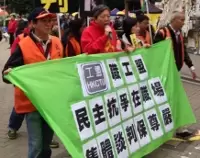Another side of Hong Kong’s democracy movement: the fight for collective bargaining rights

A collective bargaining Ordinance adopted on the eve of the July 1, 1997 transfer to the mainland was scrapped by the new Legislative Council in October that year on the grounds that it would “disrupt industrial harmony” and “adversely affect Hong Kong’s economic competitiveness and attractiveness to overseas investments”.
The HKCTU held a march and rally on December 7 to reiterate their demand for collective bargaining legislation and a 7% pay raise for Hong Kong workers, whose wages have remained stagnant over the past 15 years – boom years for the elite which dominates Hong Kong politics. Demonstrators wore their demands on the yellow ribbons adopted as a symbol by the democracy movement. Union members took their protest to major companies, including Swire Beverages (Coca-Cola). Swire members were among the HKCTU unions who struck on September 29 to show their support for the democracy movement.
An international IUF delegation will be in Hong Kong December 19-21 to show international solidarity with the HKCTU and the democracy movement.
Hing Lung Chan, a chairperson from the Swire Beverages union, speaks at the rally.

